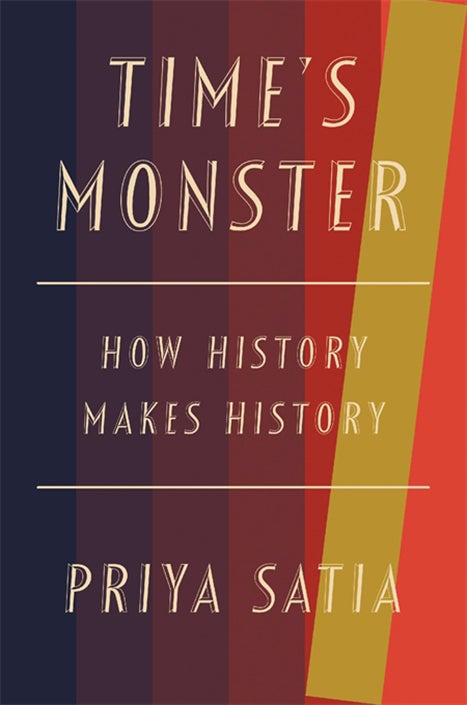The role of the historian is a complex one. For many, the term itself implies a certain distance and objectivity, someone who interprets what has come before, perhaps with the notion that those currently in power might use that information to impact the present. But what happens when historians are the ones in power, using their own understanding of the past to actively shape the present?
This question is at the heart of historian Priya Satia’s new book Time’s Monster: How History Makes History. Satia, the Raymond A. Spruance Professor of International History in the School of Humanities and Sciences, argues that when history emerged as a mode of ethics in the 18th century, British historians became the source of morally questionable decisions in the building of a vast empire that resulted in suffering for millions of subjugated peoples.
“In the last half of the 18th century, Enlightenment philosophers said we needed to study the past for moral education – as a source of ethical guidance,” Satia said. “Before that, societies wouldn’t have looked to history but to theology, or astrology or community culture. While those things also remained, this new idea began taking hold, and it became dominant among a set of British elites who became architects of the British Empire.”
These elites included historians and statesmen from John Stuart Mill to Winston Churchill. “Now politicians listen to economists,” Satia said. “That’s recent. Until the 1980s in Britain, if you wanted a career in government you were told to study history.”
In the 18th century, the newly emerging discipline of history taught that one couldn’t truly understand the meaning of events as they occurred. Historians, many of whom were policymakers themselves, taught those overseeing the building and managing of the Empire to overlook their ordinary moral instincts to serve something larger than themselves – a grand historic plan guided by divine Providence.
Although Enlightenment thinkers are often thought of as secular, Satia argues that many were guided by the assumption that human actions were for a higher, divine purpose. That assumption allowed them to legitimize the morally questionable plans that led to large populations being oppressed in South Asia, the Middle East and Africa, as well as in other parts of the British Empire.
“Through a series of stories about empire, we will grasp how understandings of conscience, derived from a historical sensibility, mattered in the unfolding of modern history,” Satia writes in the book’s introduction. “The major forces of that history – imperialism, industrial capitalism, nationalism – were justified by notions of progress and thus liable to rationalizations about noble ends justifying ignoble means.” To illustrate her point, Satia cites examples of British violence that resulted in the deaths of millions in Kenya and tens of thousands in Sudan.
Moreover, Satia contends that this kind of rationalizing is not confined to the past. The current climate crisis, she argues, is also the result of cultural norms that prioritized individuals and material progress on the presumption of future vindication. “At the moment, climate change negotiations remain captive to the legacy of empire, as postcolonial nation-states demand the right to prove their capacity to catch up, while their former colonizers paternalistically ask them to renounce that dream in the name of climate conservation,” Satia writes.
The costs of an ethical system that defers judgment to the future are also at the heart of current conversations about reparations and memorialization. “We should regret that we suppressed our moral compasses,” Satia told Stanford News. “Instead of taking progress as our guiding concept, we might have been guided by the goals of justice, love, peace, connection. Progress is not the narrative of history.”
Throughout her scholarship, Satia juxtaposes the creation of empire with ideas of anticolonial thinkers like William Blake, E.P. Thompson and Mahatma Gandhi, who said that there’s not going to be an end of time where everything is perfect.
“Gandhi’s point was to have ethical integrity in the here and now,” Satia said. “We don’t need to fulfill the vision of development economics to see what a civilized person is. It’s ethics that make someone civilized.”
Understanding the complex and often ethically questionable choices of historians is important because policymakers of today should not suppress their better judgment in the hopes of creating an idealized future, Satia said. “It is time that the producers and consumers of history together concede that there is no narrative of progress that might justify a moral wrong,” she writes in the book’s conclusion.
Rather, Satia says, historians should strive to give a sense of the fullness of time. “We’re not ever just living in the present; we’re always carrying the past with us. And we should never only have our eyes on the future,” she said. “History can keep us connected to all times and that experience of time is important to being human.”

